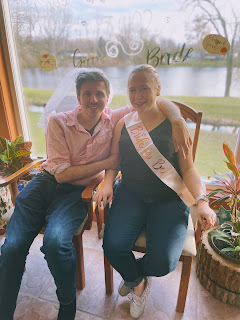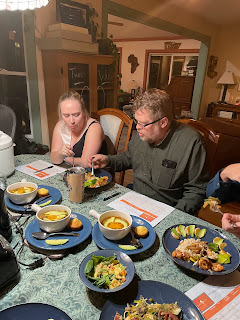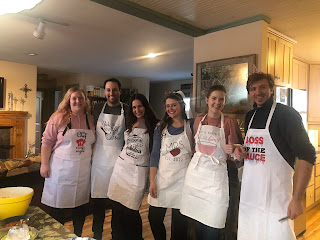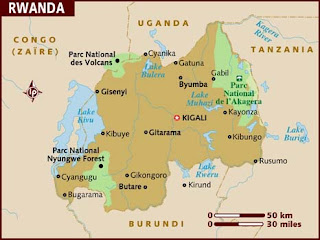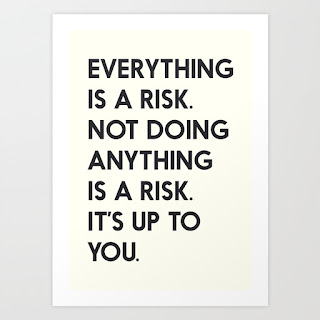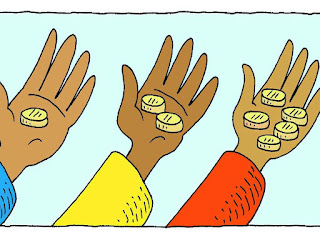When I look back over my own faith journey, I'm sometimes surprised to realize that I've essentially been pastored by two men. From birth to age 17, I attended the churches where my father was the pastor. At age 17, I moved from Canada to Grand Rapids and started attending Madison Square Church, and Pastor David Beelen was my pastor until he retired a couple of years ago. That is a lot of years of influence on my life and faith, especially from Pastor Dave!
A recurring exhortation that Pastor Dave would use in his teaching was that all Christians need to fine-tune their own "crap detectors" in order to determine what was Biblical truth and what was not. I remember chuckling over that phrase - one that my father, the other pastor in my life, would NEVER have used and definitely not from the pulpit! What's even better is that Pastor Dave had a "crap detector" built and brought it to the pulpit on many a Sunday to press home the illustration. His goal was to get us to not blindly accept what was taught from the pulpit or anywhere else, but to learn the word of God and bury it in our hearts.
Over the years, my crap detector has become finetuned in detecting some specific foul-smelling errors relating to my passion and my work. My crap detector has been known to go off when I hear or read false or muddled unbiblical ideas especially around the concepts of the sacred/secular divide, the theology of work, and the purpose of our place in creation. Others may have their crap detector attuned to different biblical issues and problems. For my husband, Michael, for example, who has spent his adult life being an editor for New Testament studies and theology, his crap detector is very attuned toward Pauline studies and matters relating to what Paul teaches.
I pray your indulgence as I am going to spend a few blogs pointing out where my crap detector has been going off lately. I hope that in sharing these things within the body of Christ, the Holy Spirit will help us all to be attuned to God's word, keeping our "crap detectors" finely tuned for the falsehoods that so easily pose as truth.
The first alarm bell I want to sound is the way Christians misunderstand and misuse the word "blessing." My crap detector has gone off for some time when I hear how believers use this word, but only recently has it become clearer to me why this is so.
My crap detector has gone off when I hear Americans talk about how blessed we are to live in this country of relative safety, wealth, and opportunity. Don't get me wrong, I am thankful to live in the US, especially all the more so this last week with the war between Russia and the Ukraine. However, in my mind, I wondered when I hear such things from other believers: "Is this really a blessing? The way in which our country has achieved our current state of prosperity and relative peace was not exactly 'Christian' in many ways. How do we now get to say, 'Thank God for these blessings?'
A secondary bell goes off on the old detector as well. Doesn't this level of 'blessing' that we so enjoy tend to lead to complacency, apathy, and express itself in a lack of need for God? Are we not fast moving toward a post-Christian era in the US because of our individual, cultural, even spiritual attitude toward these "blessings?" Would not the flip side be that if this prosperity and relative peace is blessing for us, then Ukraine is not blessed? Or there is no blessing for Nigeria, Ethiopia, Burkina Faso, or other countries dealing with on-going conflict or poverty? Intentional or not, we, as Americans, thank God and cling to these privileges received as blessings, as if they are richly deserved.
To be fair, my crap detector has also sounded when I have left American shores. It's gone off when, for example, I hear Africans praying for blessings. Frequently enough, there has been a subtle (or less than subtle) subtext that to receive a blessing, a believer must have enough faith, or spend enough time in prayer, or plant a large enough seed, or be holy enough. In this case, it's as if the blessing is earned.
Maybe my crap detector has become heightened to the question of "blessing" because of Bob's death. Many missionaries talk about how blessed they have been by God in His protection; that was not something I could say after Bob's death. Or maybe it has become sharpened through spending so much time in countries with poverty, disease, conflict, and war, so that when I hear North American Christians pray for what we enjoy and describe as "blessings," it sounds hollow and superficial. What we in the US might perceive as a lack of blessings, may be the rich fertile soil for a deeper understanding. As New Testament believers and Christians in most of the world know from experience, even as we are going through trials, it does not mean that we are not blessed. Both Matthew 5:5-6 and James 1:12 reminds us that we are blessed when we are under trial and persecution. (Matthew 5:5-6, Message version:
"You're blessed when you are at the end of your rope. With less of you there is more of God and his rule. You're blessed when you feel you've lost what is most dear to you. Only then can you be embraced by the One most dear to you." James 1:12 - "
Blessed are those who persevere under trial, because when they have stood the test, they will receive the crown of life that God has promised to those who love him.")
In this case, blessings are not an event or a material good, but it is the loving word of our Father over our lives that is revealed on our life's journey.Blessings cannot be earned NOR are they deserved NOR are they an event. Blessing is an empowering or an equipping. It is not passive receiving.
God does not ask us to do something without empowering us to do what He is asking. His blessings are an active equipping. In Genesis 1:28, we were blessed before we did anything, in order for us to fulfil our purpose on this earth. We are blessed to be fruitful. We are blessed to reign. Those blessings are for all nations, for all people, made in HIS image, flourishing in this amazing world that He has created, with resources for all to use for our own flourishing and the flourishing of others.
We are blessed to be a blessing just like Abraham (Genesis 12:2 and Galatians 3:9).
Inherent in this is that we should be careful when we pray for a blessing. To whom it is given, much is required. We are to pass that blessing on to others. We are to keep open hands before the Lord when He gives blessings. These blessings are not ours to hold tight to and try to control. But rather, with open hands, we give the opportunity for these blessings to be a renewable resource that can make nations great, and people flourish.
Does your crap detector go off when reading this blog? If so, please feel free to write me at renita@dmleaders.org. And I would also love to hear what makes your crap detector go off!








